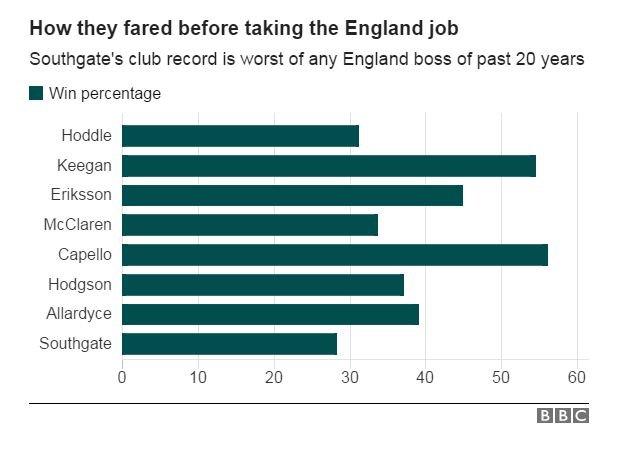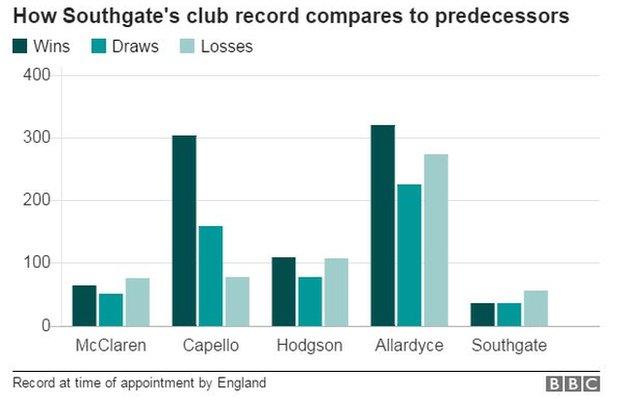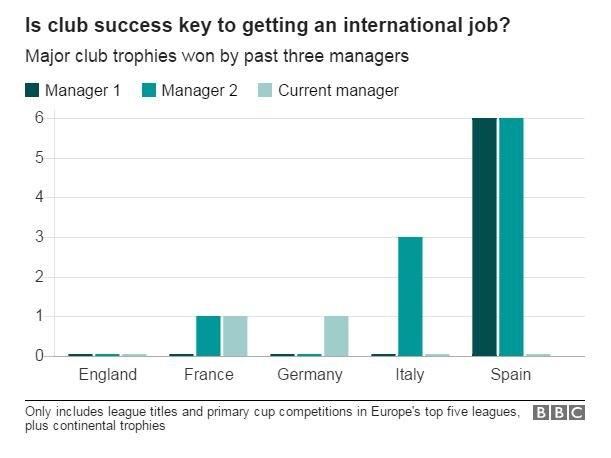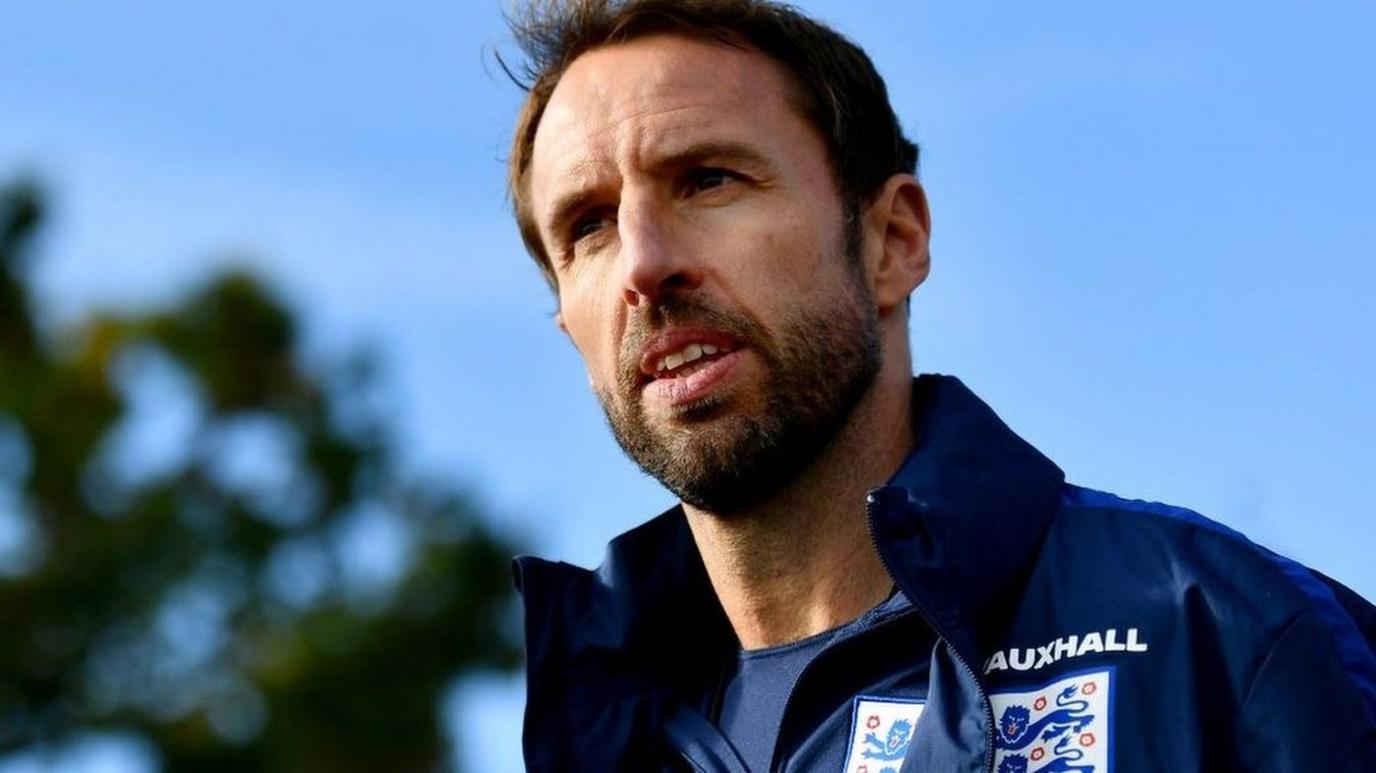Gareth Southgate appointed England manager: Is he good enough?
- Published
- comments
Five reasons to like Southgate's appointment
Gareth Southgate has been confirmed as England manager after emerging successfully from a four-game audition to succeed Sam Allardyce.
The Football Association has gone in-house with the choice of England's Under-21 manager in the search for stability and success following the Euro 2016 debacle, the immediate resignation of Roy Hodgson after the last-16 defeat by Iceland and Allardyce's ill-fated 67 days in charge.
Southgate's managerial experience is limited - so is he the right man to finally bring England out of the years of darkness?
Is Southgate good enough?

Southgate is a first-timer at this elite level and his time in management is short on high points. The 46-year-old is, however, well aware of its brutal realities.
He succeeded Steve McClaren as Middlesbrough manager in 2006 and his three full seasons in control were undistinguished, finishing 12th and 13th before relegation to the Championship at the end of the 2008-09 season.
Southgate was sacked after 13 games in the Championship with the Teessiders sitting fourth and he left having won won only 36 out of 127 league games in charge.
Southgate has rebuilt his managerial career since taking over as England Under-21 coach in August 2013.
He endured a miserable Euros in 2015 when England's youngsters went out at the group stage but he was hampered by the FA's decision to omit players such as Raheem Sterling, Jack Wilshere and Ross Barkley.
He saw the other side as England won the prestigious Toulon tournament in France in May - but is this enough to warrant the top job?

Southgate is steeped in FA tradition, having had an 18-month spell as its head of elite development between January 2011 and July 2012.
He knows what the England job entails after close contact with Hodgson and Allardyce and has developed a taste for the pressures after his interim time in charge.
Sir Trevor Brooking, instrumental in bringing Southgate into the FA fold during his time as director of development, has fervently championed his cause, while ex-England captain Terry Butcher told the BBC: "Gareth is the right man for the job. He is a personable guy and he has shown he wants to learn and adapt.
"He will learn in the job and I am absolutely certain he will learn well. He will develop his own coaching prowess at international level."
And as someone who won 57 England caps between December 1995 and March 2004 and had a distinguished playing career as captain of Crystal Palace, Aston Villa and Middlesbrough, Southgate is a relatively recent former international player who has shown an ability to relate to his players, especially the younger generation England will rely on in the future.
Southgate, however, represents a low-key appointment and while qualification for the 2018 World Cup looks likely, he faces a stern examination if England reach Russia.
The media verdict:
Daniel Taylor, chief football writer for the Guardian and the Observer: "I certainly find it perplexing that a manager who was sacked by Middlesbrough, having been relegated the previous season, is considered the mandatory choice on the back of a plodding win against Malta, a pretty wretched 0-0 draw in Slovenia and then a flattering victory against one of the worst Scotland teams in years. Southgate has done reasonably well, overall, but it is difficult to feel too enthused."
John Cross, chief football writer for the Daily Mirror: "I think he's experienced, fits the mould and if you look at Joachim Low with Germany or even Spain these days, they've gone through the system without being big names. Southgate is worth a shot."
Henry Winter, chief football writer at the Times: "He is good enough. England are an average team and Southgate's record with club and Under-21s indicates an average manager but he can develop with a young squad. He has handled it well so far and is tougher than perceived."
Is he England's accidental manager?
Southgate kept a safe distance from the England job when he was mentioned as a possible caretaker after Hodgson's departure in June and it was only in September that he said he was not ready for it.
"I think with England there are one or two other things that I would want to have had experience of before I took that role," he said at that time.
It is obvious what has changed since then.
When Southgate outlined his reluctance, he was speaking from a position where Allardyce looked a safe bet for two years at least, leaving him free to gather further experience before taking over.
All that changed in the moment Allardyce was caught in a newspaper sting. What Southgate called "the ultimate" job was suddenly available with no guarantee of when it might become vacant again.
So, with Allardyce gone, is this simply a case of Southgate being last man standing and an easy, safe choice for the FA?
"We've tried the big names like Sven-Goran Eriksson and Fabio Capello, the guys with amazing CVs," former England defender Danny Mills said.
"We haven't tried this one - someone who has come through with the Under-21s, who knows the players, knows their strengths.
"Tell us why he is the wrong man? Who is out there who is the right man with better qualifications to take this job on? I don't think there is anyone."
The media verdict:
Cross: "He has most definitely stumbled into this job because if the FA had appointed him in the summer after Roy and before Sam, he wouldn't have been accepted by fans or media in my opinion."
Taylor, who suggests ex-Manchester City manager Roberto Mancini would have been a credible option: "Let's be clear, he is in this position almost by default because of a lack of alternatives. If there was a great deal of choice Allardyce would never have been given the job in the first place."
What is Southgate's top priority?
Simple and difficult at the same time - win matches at major tournaments.
England have no trouble racking up victories in qualifiers. They have won 24 and drawn eight of their past 32 but in world terms they have gone backwards because they do not win when it matters.
Hodgson won all 10 Euro 2016 qualifiers yet lost in the last 16 to Iceland in Nice.
He strode a similarly comfortable path to the 2014 World Cup in Brazil and yet England did not make it out of the group stage.
Highlights: England 1-2 Iceland
Capello's England were humiliated 4-1 by Germany in the last 16 in South Africa in 2010, while the side that qualified comfortably for Euro 2012 lost in their first knockout match, to Italy on penalties, under the recently appointed Hodgson.
It is a pattern Southgate is charged with changing - and he must do it by summer 2018.
He must find the answer to making the England shirt weigh less when measured by pressure and break down the psychological barrier that grips talented players when the heat is on. It has eluded more experienced managers than him.
The media verdict:
Winter: "It is simple - rid England of fear."
Cross: "Southgate is expected to qualify and then do better. I'd love to see him encourage a new generation of 19- to 25-year-olds and get them playing good football."
Taylor: "Twisting an old quote from Tommy Docherty about Scotland - he must make sure England are not back before the postcards at the next World Cup."
Is England still a big job?
This is the era of the blue-chip manager, with many operating in the Premier League, including Liverpool's Jurgen Klopp, Pep Guardiola at Manchester City and ex-Italy boss Antonio Conte at Chelsea.
So is it a sign of the diminishing status of the England job that it has been handed to a man whose only experience of top-flight management ended in relegation?
Sven-Goran Eriksson quit Italian giants Lazio to take the England job in January 2001, the season after winning the Serie A title. Fabio Capello had also enjoyed coaching success, claiming four Serie A titles and the Champions League with AC Milan, winning La Liga twice in two spells at Real Madrid and the Scudetto with Roma and Juventus.
This pedigree did not prove a guarantee of success.
Southgate has no such background but he has carefully gone about developing as a manager after the Middlesbrough experience and has won praise for his work and man-management of England Under-21s.
And the FA has no recent track record of going with proven success.
Steve McClaren succeeded Eriksson after taking Middlesbrough to 14th position in the Premier League and a Uefa Cup final where they were thrashed 4-0 by Sevilla.
Hodgson took over from Capello in 2012 after guiding West Bromwich Albion to a respectable 10th league placing, while Allardyce was celebrated as England's bright future when he was appointed as a 61-year-old having pulled Sunderland away from relegation with one game left last season.

The FA is not alone in this approach.
Spain appointed Julen Lopetegui to replace the successful Vicente del Bosque in July. He had coached Spain's junior teams but was sacked by Porto in January and had been linked with Wolves.
Italy went for the veteran journeyman Giampiero Ventura to succeed Conte. The 68-year-old is highly respected but his only trophy was a third division title with Lecce in 1996 and he took Torino to 12th in Serie A last season.
So the FA may simply be following the new reality of international football by going with what it knows rather than Southgate's appointment being judged as a signal of safety and a lack of wider ambition.
The media verdict:
Cross: "It's still a big job. It pays well. It's high profile. I think Mancini and Jurgen Klinsmann would want it and, if the time was right, even maybe Arsene Wenger. The FA has wanted an Englishman. Eddie Howe will be the next England manager, in my view, but for now Southgate is the only man out there."
Winter agrees and adds: "Club jobs command more money but anybody who turns England around will get unbelievable headlines."
- Published30 November 2016

